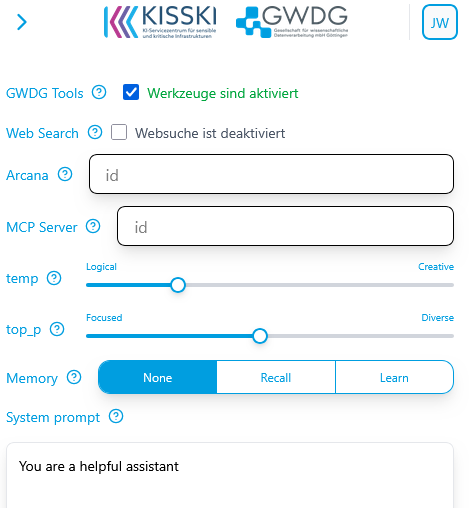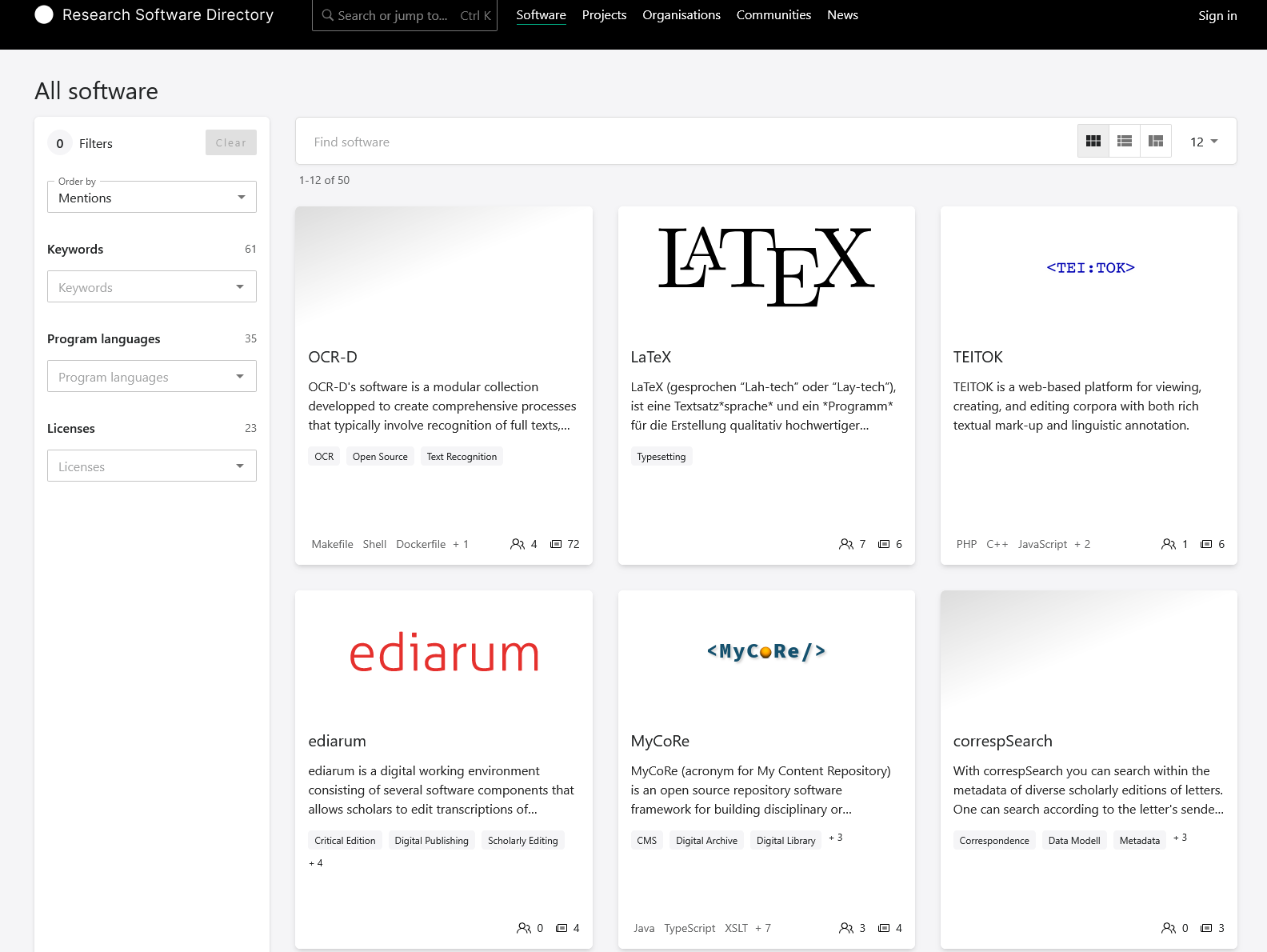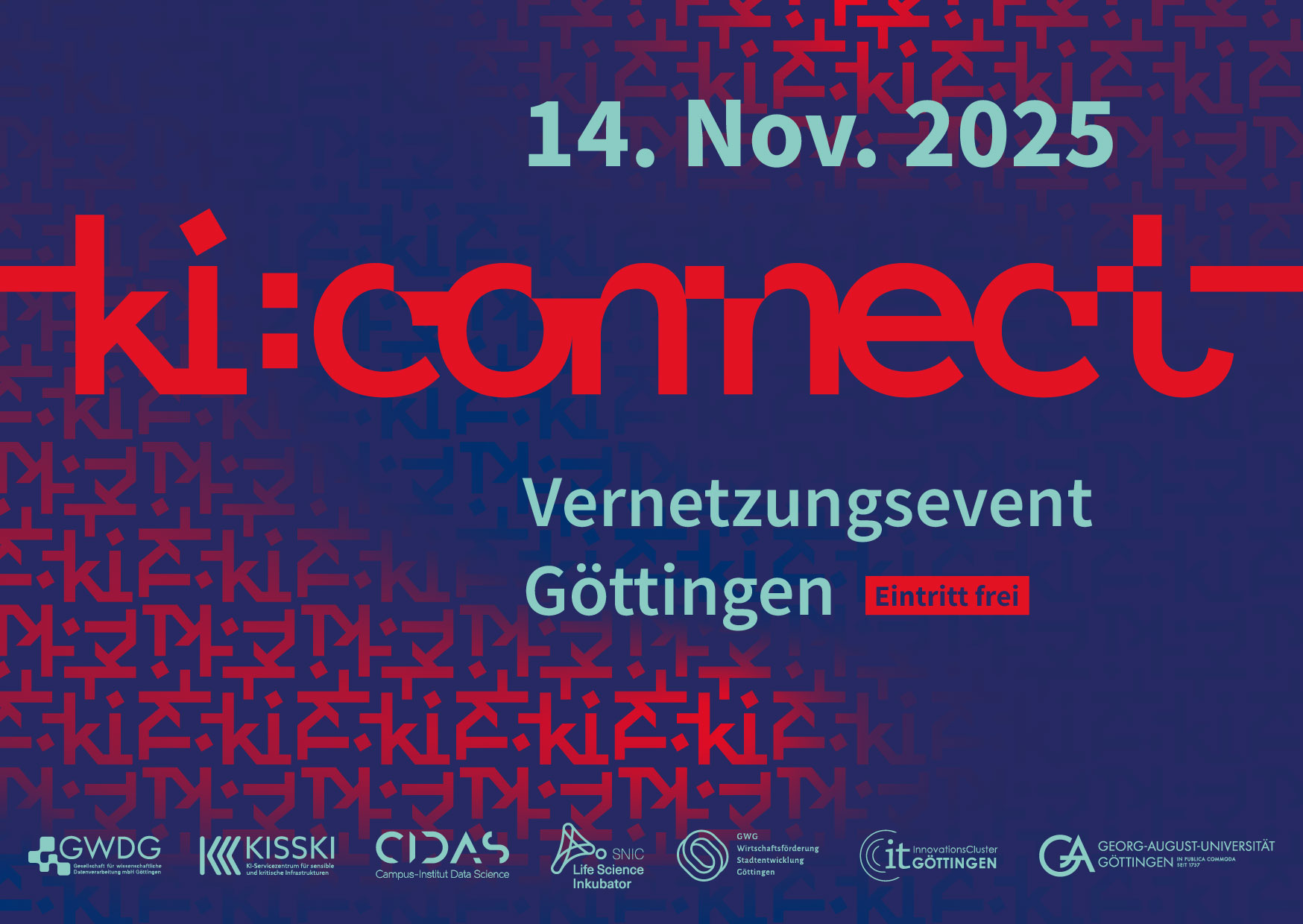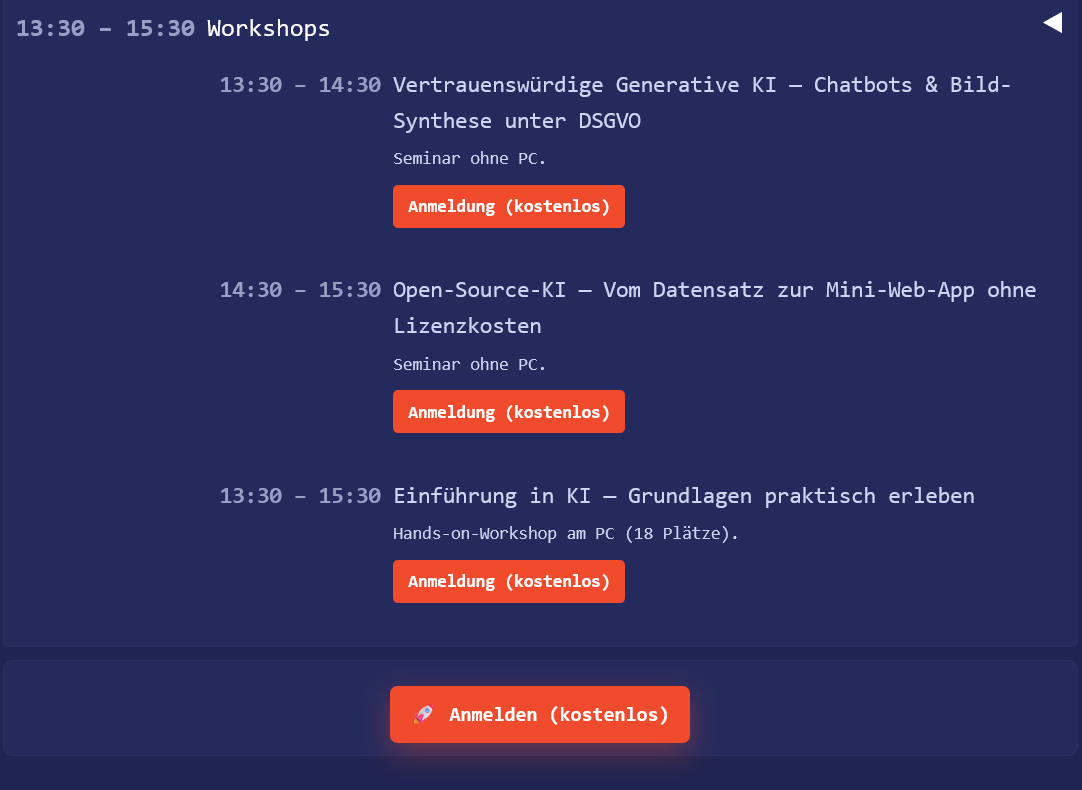Entschuldigung aber dieser Post ist nur für angemeldete Benutzer sichtbar. Wenn Sie Mitglied der Digitalen Akademie werden und Zugang zu diesem Inhalt erhalten wollen, dann melden Sie sich bitte unter https://digitale-akademie.adw-goe.de/anmeldung/ bzw. im Menue Digitale Akademie > Anmeldung an. Sie werden dann nach Überprüfung umgehend einen Account erhalten und können die angefragten Seiten einsehen.
Bericht vom Treffen der Digitalen Akademie am 20.11.25 🔒
Entschuldigung aber dieser Post ist nur für angemeldete Benutzer sichtbar. Wenn Sie Mitglied der Digitalen Akademie werden und Zugang zu diesem Inhalt erhalten wollen, dann melden Sie sich bitte unter https://digitale-akademie.adw-goe.de/anmeldung/ bzw. im Menue Digitale Akademie > Anmeldung an. Sie werden dann nach Überprüfung umgehend einen Account erhalten und können die angefragten Seiten einsehen.
NFDI4Memory: FAIR Data Fellowship Ausschreibung & Infoveranstaltung am 4.11.2025
[Crossposting von der AG_digigw-Liste]
Ihr habt Forschungsdaten erhoben für ein geschichtswissenschaftliches Projekt, aber sie schlummern ungenutzt auf externen Festplatten oder in irgendeinem Unterordner?
Für alle, die das ändern möchten, gibt es die NFDI4Memory FAIR Data Fellowships.
Die bis zu elf Fellows arbeiten ihre historischen Forschungsdaten mit Beratung von Expert:innen im Forschungsdatenmanagement bis zur Publikation auf.
Die einmonatigen Fellowships sind mit je 1.500,- Euro dotiert und können remote stattfinden. Sie richten sich an alle Historiker:innen und historisch Arbeitenden egal mit welchen Vorkenntnissen – entscheidend ist die Motivation, die eigenen historischen Forschungsdaten aktiv mit der Community teilen zu wollen.
Bewerbungsfrist ist der 19.11.2025 – internationale Bewerbungen sind willkommen! Weitere Informationen zur Ausschreibung: https://4memory.de/fileadmin/files/Calls/Fellowships/Ausschreibung_2026_dt.pdf
Für alle Kurzentschlossenen: Heute, Di. 04.11.2025, findet um 14 Uhr eine online Informationsveranstaltung zu den FAIR Data Fellowships und der aktuellen Ausschreibung statt. Der Zugang erfolgt ohne Voranmeldung über Zoom.
Weiter Informationen zu den NFDI4Memory FAIR Data Fellowships auch auf unserer Website: https://4memory.de/aktivitaeten/fellowships/
Herzliche Grüße aus dem NFDI4Memory Coordination Office!
P.S.: Eventuellen Mehrfachempfang bitten wir zu entschuldigen.
—
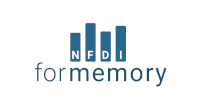
M 4memory@ieg-mainz.de
Leibniz-Institut für Europäische Geschichte (IEG)
Alte Universitätsstr. 19
55116 Mainz Germany
4memory.de
Neues UI und RAG bei https://chat-ai.academiccloud.de/
Das User Interface der KI-Chatumgebung, die von der gwdg und anderen Partnern zur Verfügung gestellt wird, wurde überarbeitet. Es gibt jetzt auch die Möglichkeit, sehr einfach ein RAG System anzulegen und somit die eigenen Daten mit in Antwort des LLMs einfliessen zu lassen. Der Service heisst Arcana und ist hier zu finden.
Neues Research Software Directory der Uni Köln / text+
Hinweis Fortbildung: DIGITAL HUMANITIES BROWN BAG LUNCH Using AI to extract structured data from complex historical documents, OCT 21 2025 12:00–13:00, MPIWG – online
Hier ein Hinweis auf eine interessante Fortbildung, die am 21. Oktober 2025 zur Mittagszeit online und in Präsenz stattfindet:
Scan to attend by Zoom or visit
tinyurl.com/dhbbloct
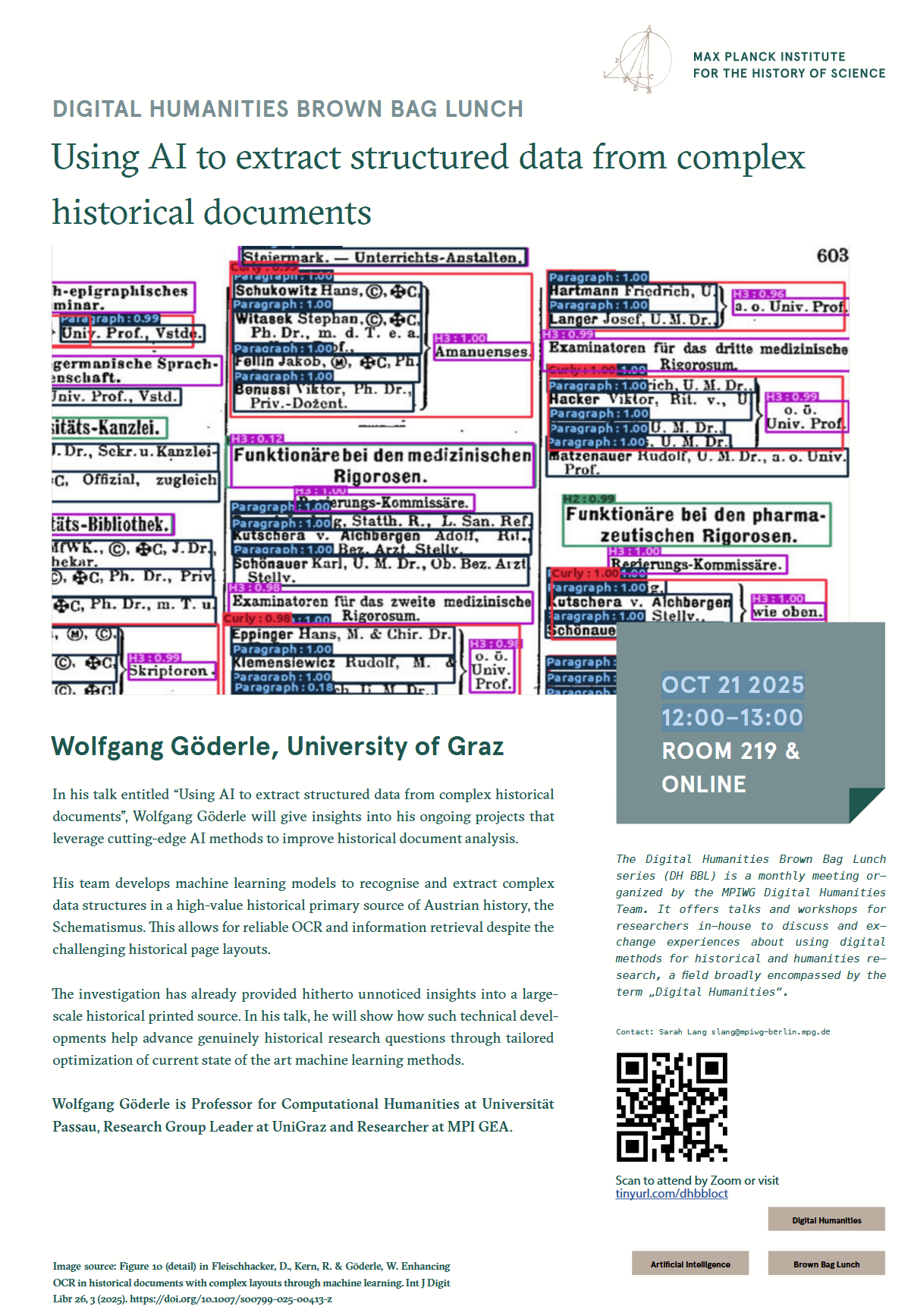
DIGITAL HUMANITIES BROWN BAG LUNCH
Using AI to extract structured data from complex
historical documents
In his talk entitled “Using AI to extract structured data from complex historical
documents”, Wolfgang Göderle will give insights into his ongoing projects that
leverage cutting-edge AI methods to improve historical document analysis.
His team develops machine learning models to recognise and extract complex
data structures in a high-value historical primary source of Austrian history, the Schematismus. This allows for reliable OCR and information retrieval despite the challenging historical page layouts.
The investigation has already provided hitherto unnoticed insights into a large-
scale historical printed source. In his talk, he will show how such technical developments help advance genuinely historical research questions through tailored optimization of current state of the art machine learning methods.
Wolfgang Göderle is Professor for Computational Humanities at Universität
Passau, Research Group Leader at UniGraz and Researcher at MPI GEA.
The Digital Humanities Brown Bag Lunch
series (DH BBL) is a monthly meeting or-
ganized by the MPIWG Digital Humanities
Team. It offers talks and workshops for
researchers in-house to discuss and ex-
change experiences about using digital
methods for historical and humanities re-
search, a field broadly encompassed by the
term „Digital Humanities“.
Bericht vom Treffen der GDA am 16.10.2025 🔒
Entschuldigung aber dieser Post ist nur für angemeldete Benutzer sichtbar. Wenn Sie Mitglied der Digitalen Akademie werden und Zugang zu diesem Inhalt erhalten wollen, dann melden Sie sich bitte unter https://digitale-akademie.adw-goe.de/anmeldung/ bzw. im Menue Digitale Akademie > Anmeldung an. Sie werden dann nach Überprüfung umgehend einen Account erhalten und können die angefragten Seiten einsehen.
GWDG Vernetzungsevent: „Künstliche Intelligenz in Theorie und Praxis“, 14.11.25, 8-16 Uhr, GWDG Rechenzentrum, Burckhardtweg 4, 37077 Göttingen (mit Workshops!)
CFP DH2026 in Daejeon, Südkorea. Deadline 8. Dezember 2025
Bericht vom Treffen der GDA am 25.9.25 🔒
Entschuldigung aber dieser Post ist nur für angemeldete Benutzer sichtbar. Wenn Sie Mitglied der Digitalen Akademie werden und Zugang zu diesem Inhalt erhalten wollen, dann melden Sie sich bitte unter https://digitale-akademie.adw-goe.de/anmeldung/ bzw. im Menue Digitale Akademie > Anmeldung an. Sie werden dann nach Überprüfung umgehend einen Account erhalten und können die angefragten Seiten einsehen.










